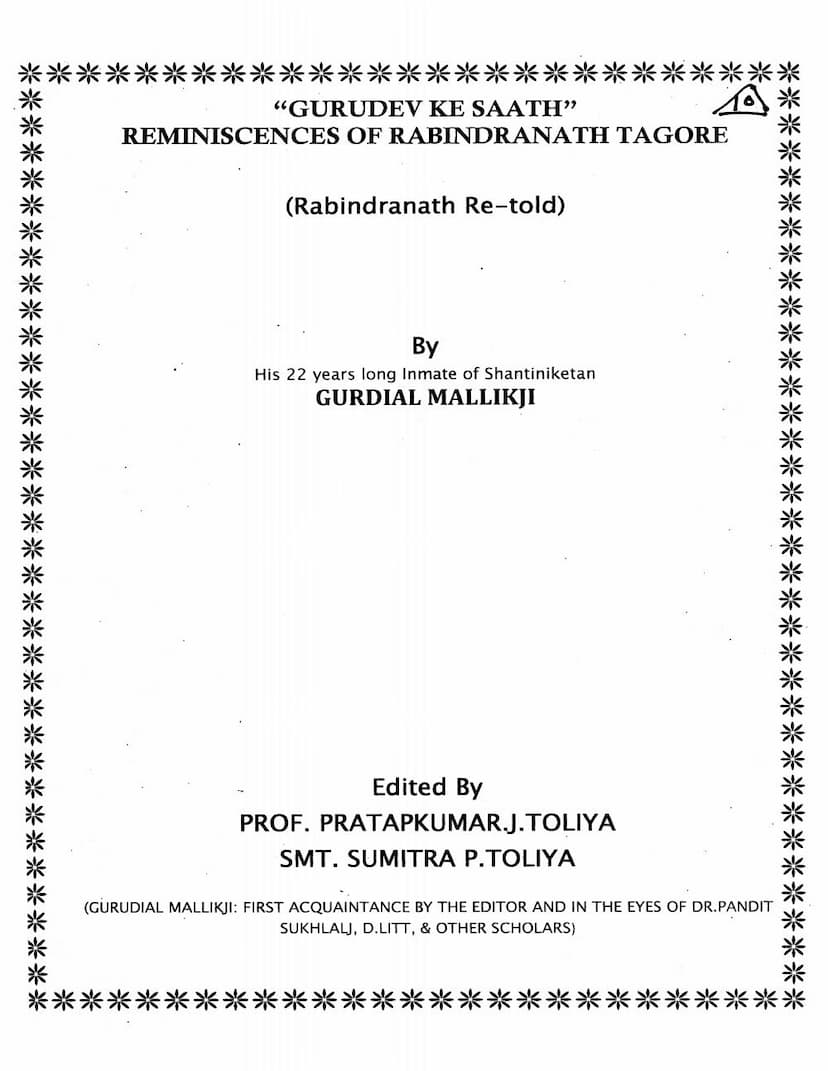Gurudev Ke Saath
Added to library: September 1, 2025

Summary
The book "Gurudev Ke Saath" (With Gurudev) is a collection of essays and reminiscences about Rabindranath Tagore, written by Gurdial Mallikji, who was a long-time inmate of Shantiniketan. The book is edited by Prof. Pratapkumar J. Toliya and Smt. Sumitra P. Toliya. It also includes contributions and perspectives from other scholars, notably Dr. Pandit Sukhlalji.
The book delves into various aspects of Rabindranath Tagore's life, philosophy, and his profound influence on Gurdial Mallikji and others. Here's a breakdown of the key themes and content covered, based on the provided pages:
Core Themes and Content:
- Gurdial Mallikji's Devotion to Gurudev: The central theme is Mallikji's deep reverence and love for Rabindranath Tagore, whom he served for 22 years at Shantiniketan. This relationship is described as akin to a spiritual bond, with Mallikji seeing Tagore as a guru and even a parental figure.
- Influence of Mallikji's Mother: A significant portion of the initial content focuses on Mallikji's formative experiences, particularly the profound influence of his mother's death. Her dying advice shaped his life's principles: to practice silence and contemplation, to inquire about the well-being of others, and to approach great souls with humility. These principles guided his interactions with Gurudev and Mahatma Gandhi.
- Mallikji's Unique Relationship with Tagore: Mallikji famously called himself "Dumb Gurdial" because, despite spending 22 years with Tagore, he spoke with him for a mere 22 minutes. This silence was a conscious choice, following his mother's advice to "lock your tongue and mind" when approaching great people. He believed in absorbing their essence through observation and inner connection rather than discourse.
- Tagore's Spiritual Insights and Creative Process:
- The Mystic Humming: Mallikji describes Tagore's spontaneous humming sessions, which often preceded his writing. Tagore explained this as an act of transcribing divine music from an unseen celestial singer, accepting the resulting words as a gift from God.
- "The Post Office": The book details the inspiration behind Tagore's play "The Post Office," stemming from an encounter with a postman and a mad woman. Tagore saw the play as representing the connection between the finite and the infinite, and the importance of keeping a "window open" to the world.
- "Gitanjali" and the Divine Signature: Mallikji discusses his study of Gitanjali, emphasizing that true artistic creation comes from inner inspiration and that "Beauty is the signature of God." He highlights the idea that the artist acts as a medium for a higher power.
- Vishwa Bharati - A Guest House of World Culture: The establishment of Shantiniketan, and later Vishva Bharati, is explained as an attempt to create an environment of joy, freedom, and holistic education, fostering a "guest house of world culture" where diverse traditions could meet. The emphasis was on learning through experience, art, music, and service, rather than rote memorization.
- Civilization as an Ever-Enlarging Horizon: Tagore's concept of civilization is presented as a continuous expansion of consciousness, a "codence of comradeship" that unites people and nations through love and understanding.
- Tagore's Aspirations: The book explores Tagore's aspirations, which aligned with those of Buddha (Maitri Dharma) and Ram Mohan Roy (social reform and cultural ambassadorship). He emphasized the importance of art, music, and service, and the need to forget oneself to realize the divine.
- The Nature of Love: A significant section is dedicated to understanding "Love - All-in-All of Gurudev's Life." Mallikji posits that for prophets and poets, love is everything, not just a part of life. True love is characterized by sacrifice, freedom, humility, and the ability to see the divine in all. It is an expansion, not a contraction, and requires a pure heart to truly see God.
- The Role of Ego: The book repeatedly touches upon the destructive nature of ego and pride, which hinder true spiritual realization and love. Mallikji emphasizes the need to transcend the "I-ness" to connect with the divine.
- Professor Toliya's Experiences: Prof. Toliya shares his personal journey to Shantiniketan for higher studies in Hindi and Rabindra Sangeet. He recounts his interactions with Tagore's disciples and the challenges he faced, particularly regarding the presence of non-vegetarian food on the campus, which was a stark contrast to the spiritual ideals of Shantiniketan. He also shares fond memories of learning Rabindra Sangeet and introducing Gujarati folk songs.
- Mallikji in the Eyes of Scholars: The book includes perspectives from other scholars, like Dr. Pandit Sukhlalji, which attest to Mallikji's spiritual depth and influence.
- Jain Philosophy Connection: While the book is primarily about Tagore, the references to Jain scholars like Dr. Pandit Sukhlalji and the mention of Jain philosophical principles in relation to Mallikji suggest an underlying appreciation for or connection to Jainism. The editor, Pratapkumar J. Toliya, is also presented as having a background influenced by Jain principles.
In essence, "Gurudev Ke Saath" is a tribute to Rabindranath Tagore through the eyes of a devoted disciple. It offers deep insights into Tagore's philosophy, creative process, and the spiritual journey of Gurdial Mallikji, highlighting themes of love, self-realization, the transformative power of art and music, and the importance of living a life of purpose and spiritual connection.